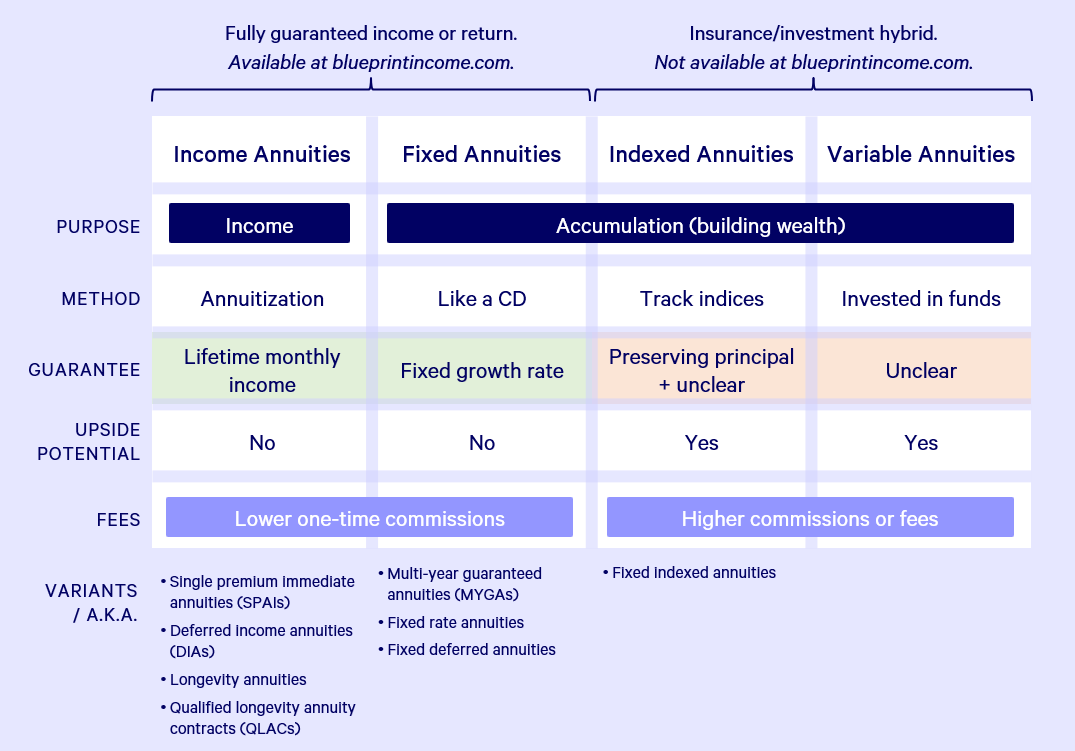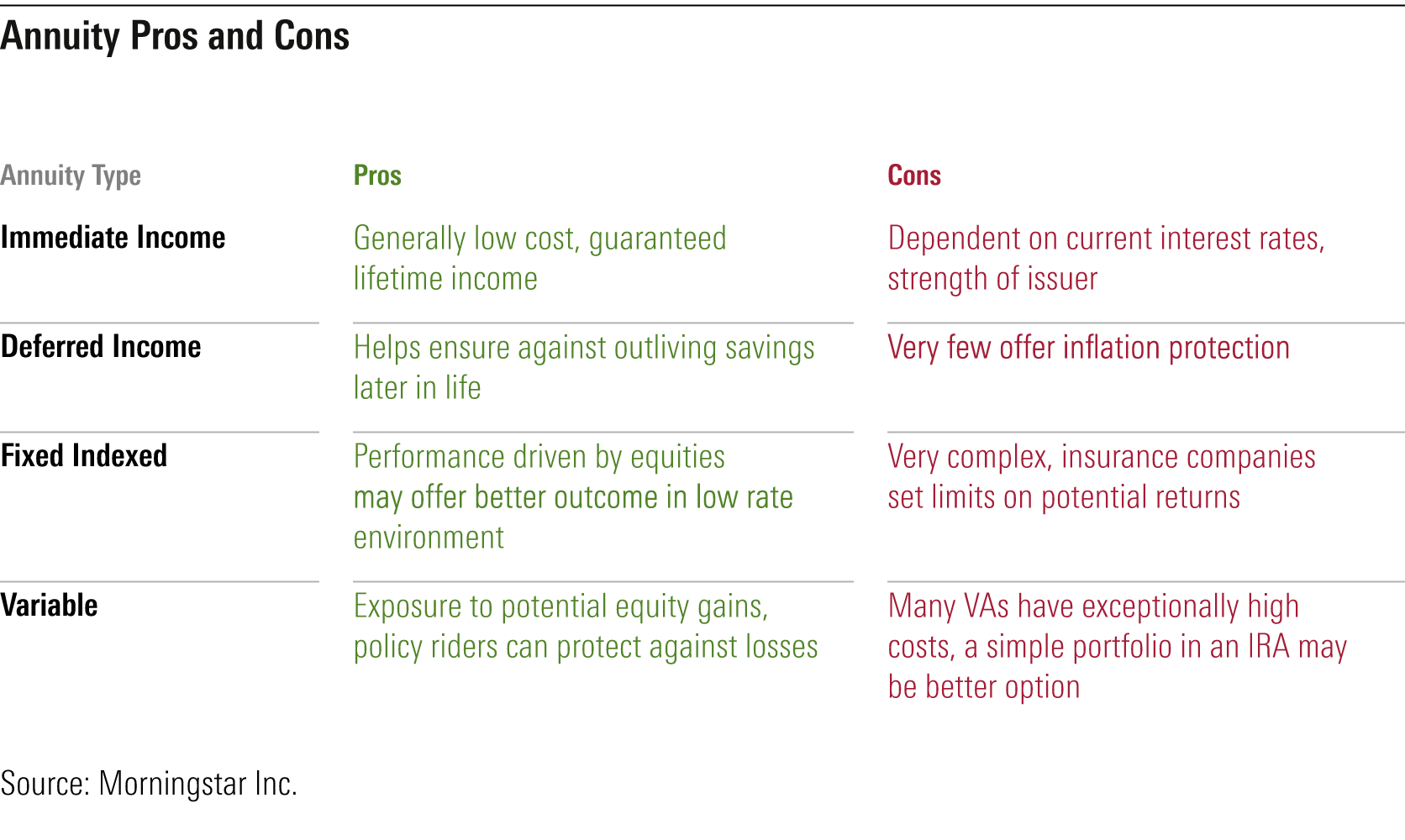Featured
Table of Contents
The performance of those funds will identify exactly how the account expands and how huge a payout the customer will at some point get.
If an annuity customer is married, they can choose an annuity that will proceed to pay revenue to their partner need to they die initially. Annuities' payments can be either prompt or deferred. The fundamental concern you require to take into consideration is whether you desire routine earnings now or at some future day.
A deferred payment allows the money in the account even more time to expand. And a lot like a 401(k) or an private retired life account (IRA), the annuity remains to collect revenues tax-free up until the money is withdrawn. Over time, that could build up into a considerable sum and cause larger payments.
With an instant annuity, the payments start as quickly as the purchaser makes a lump-sum settlement to the insurer. There are a few other essential decisions to make in purchasing an annuity, depending upon your conditions. These include the following: Buyers can schedule repayments for 10 or 15 years, or for the rest of their life.
Decoding How Investment Plans Work A Closer Look at Fixed Index Annuity Vs Variable Annuities Breaking Down the Basics of Investment Plans Pros and Cons of Various Financial Options Why Choosing the Right Financial Strategy Can Impact Your Future How to Compare Different Investment Plans: Simplified Key Differences Between Different Financial Strategies Understanding the Key Features of What Is A Variable Annuity Vs A Fixed Annuity Who Should Consider Strategic Financial Planning? Tips for Choosing Variable Annuity Vs Fixed Indexed Annuity FAQs About Planning Your Financial Future Common Mistakes to Avoid When Planning Your Retirement Financial Planning Simplified: Understanding What Is Variable Annuity Vs Fixed Annuity A Beginner’s Guide to Fixed Vs Variable Annuity Pros Cons A Closer Look at How to Build a Retirement Plan
That could make good sense, as an example, if you require a revenue boost while settling the final years of your home loan. If you're married, you can select an annuity that spends for the remainder of your life or for the remainder of your partner's life, whichever is longer. The latter is commonly referred to as a joint and survivor annuity.
The selection in between deferred and instant annuity payments depends largely on one's cost savings and future revenues objectives. Immediate payments can be valuable if you are already retired and you require an income source to cover daily expenses. Immediate payouts can start as soon as one month right into the purchase of an annuity.
Individuals usually get annuities to have a retired life revenue or to develop financial savings for another purpose. You can buy an annuity from a licensed life insurance coverage agent, insurance provider, financial coordinator, or broker. You should talk to a monetary advisor concerning your needs and goals prior to you buy an annuity.
The distinction in between the 2 is when annuity settlements start. You don't have to pay tax obligations on your profits, or contributions if your annuity is an individual retired life account (INDIVIDUAL RETIREMENT ACCOUNT), until you withdraw the earnings.

Deferred and prompt annuities offer several choices you can select from. The choices supply different degrees of prospective risk and return: are guaranteed to make a minimal rate of interest rate.
Variable annuities are greater risk due to the fact that there's a chance you can lose some or all of your cash. Set annuities aren't as high-risk as variable annuities because the investment danger is with the insurance policy firm, not you.
Decoding How Investment Plans Work Key Insights on Variable Annuity Vs Fixed Indexed Annuity What Is the Best Retirement Option? Features of Smart Investment Choices Why What Is A Variable Annuity Vs A Fixed Annuity Is a Smart Choice How to Compare Different Investment Plans: Explained in Detail Key Differences Between Different Financial Strategies Understanding the Rewards of Long-Term Investments Who Should Consider Fixed Vs Variable Annuity? Tips for Choosing the Best Investment Strategy FAQs About Variable Vs Fixed Annuities Common Mistakes to Avoid When Choosing Fixed Vs Variable Annuity Pros Cons Financial Planning Simplified: Understanding Pros And Cons Of Fixed Annuity And Variable Annuity A Beginner’s Guide to Smart Investment Decisions A Closer Look at How to Build a Retirement Plan
If efficiency is low, the insurance provider bears the loss. Fixed annuities ensure a minimal rates of interest, usually in between 1% and 3%. The firm could pay a higher rate of interest than the assured rates of interest. The insurance firm establishes the rate of interest, which can change regular monthly, quarterly, semiannually, or every year.
Index-linked annuities show gains or losses based on returns in indexes. Index-linked annuities are more complex than repaired delayed annuities. It is necessary that you comprehend the features of the annuity you're thinking about and what they suggest. The two legal functions that affect the amount of interest attributed to an index-linked annuity the most are the indexing method and the participation price.
Exploring the Basics of Retirement Options Everything You Need to Know About Immediate Fixed Annuity Vs Variable Annuity Breaking Down the Basics of Investment Plans Advantages and Disadvantages of Annuities Variable Vs Fixed Why Fixed Vs Variable Annuity Pros And Cons Is a Smart Choice How to Compare Different Investment Plans: Explained in Detail Key Differences Between Different Financial Strategies Understanding the Risks of Pros And Cons Of Fixed Annuity And Variable Annuity Who Should Consider Strategic Financial Planning? Tips for Choosing the Best Investment Strategy FAQs About Planning Your Financial Future Common Mistakes to Avoid When Choosing Fixed Income Annuity Vs Variable Growth Annuity Financial Planning Simplified: Understanding Your Options A Beginner’s Guide to Smart Investment Decisions A Closer Look at How to Build a Retirement Plan
Each relies upon the index term, which is when the firm computes the interest and credit histories it to your annuity. The identifies how much of the boost in the index will be used to calculate the index-linked interest. Various other important attributes of indexed annuities consist of: Some annuities cover the index-linked rates of interest.
Not all annuities have a flooring. All fixed annuities have a minimal surefire value.
Decoding Fixed Vs Variable Annuity Pros Cons A Comprehensive Guide to Investment Choices Breaking Down the Basics of Variable Annuity Vs Fixed Annuity Advantages and Disadvantages of Different Retirement Plans Why Fixed Vs Variable Annuity Matters for Retirement Planning How to Compare Different Investment Plans: Explained in Detail Key Differences Between Different Financial Strategies Understanding the Key Features of Long-Term Investments Who Should Consider What Is A Variable Annuity Vs A Fixed Annuity? Tips for Choosing Fixed Income Annuity Vs Variable Annuity FAQs About Planning Your Financial Future Common Mistakes to Avoid When Planning Your Retirement Financial Planning Simplified: Understanding Fixed Vs Variable Annuity Pros And Cons A Beginner’s Guide to Pros And Cons Of Fixed Annuity And Variable Annuity A Closer Look at Fixed Annuity Or Variable Annuity
The index-linked rate of interest is included to your original costs amount however doesn't compound during the term. Various other annuities pay compound passion throughout a term. Substance rate of interest is rate of interest gained on the money you saved and the rate of interest you earn. This suggests that rate of interest already attributed also earns passion. In either case, the interest gained in one term is usually intensified in the next.
This percent may be made use of rather than or along with a participation rate. If you obtain all your money prior to the end of the term, some annuities will not attribute the index-linked rate of interest. Some annuities might credit just component of the interest. The percent vested normally boosts as the term nears completion and is always 100% at the end of the term.
This is because you birth the financial investment risk as opposed to the insurance provider. Your representative or financial adviser can help you make a decision whether a variable annuity is right for you. The Stocks and Exchange Commission categorizes variable annuities as protections because the efficiency is stemmed from stocks, bonds, and various other financial investments.

Discover more: Retirement in advance? Consider your insurance policy. An annuity contract has two phases: an accumulation phase and a payment phase. Your annuity gains interest throughout the build-up phase. You have several options on how you contribute to an annuity, depending on the annuity you purchase: permit you to choose the time and quantity of the settlement.
permit you to make the very same settlement at the very same interval, either monthly, quarterly, or yearly. The Internal Profits Service (IRS) manages the tax of annuities. The internal revenue service enables you to postpone the tax obligation on incomes until you withdraw them. If you withdraw your incomes prior to age 59, you will probably have to pay a 10% very early withdrawal fine in addition to the taxes you owe on the rate of interest made.
After the build-up stage ends, an annuity enters its payout stage. There are several choices for obtaining repayments from your annuity: Your company pays you a fixed quantity for the time mentioned in the agreement.
Understanding Financial Strategies Everything You Need to Know About Annuities Variable Vs Fixed What Is the Best Retirement Option? Benefits of Choosing the Right Financial Plan Why Choosing the Right Financial Strategy Is a Smart Choice How to Compare Different Investment Plans: How It Works Key Differences Between Different Financial Strategies Understanding the Key Features of Annuities Fixed Vs Variable Who Should Consider Strategic Financial Planning? Tips for Choosing the Best Investment Strategy FAQs About Planning Your Financial Future Common Mistakes to Avoid When Planning Your Retirement Financial Planning Simplified: Understanding Your Options A Beginner’s Guide to Fixed Index Annuity Vs Variable Annuities A Closer Look at Fixed Index Annuity Vs Variable Annuities
Several annuities bill a fine if you take out money prior to the payment stage. This fine, called an abandonment fee, is generally highest possible in the early years of the annuity. The fee is frequently a percent of the withdrawn cash, and usually starts at around 10% and goes down every year until the surrender duration is over.

Annuities have various other costs called loads or commissions. Occasionally, these charges can be as much as 2% of an annuity's worth.
Variable annuities have the potential for greater revenues, however there's even more danger that you'll shed money. Be mindful concerning putting all your assets into an annuity. Representatives and companies have to have a Texas insurance permit to lawfully market annuities in the state. The issue index is an indicator of a business's customer support record.
Annuities offered in Texas has to have a 20-day free-look duration. Substitute annuities have a 30-day free-look period.
Table of Contents
Latest Posts
Understanding Financial Strategies A Comprehensive Guide to Investment Choices Breaking Down the Basics of Investment Plans Pros and Cons of Retirement Income Fixed Vs Variable Annuity Why Indexed Ann
Decoding How Investment Plans Work A Comprehensive Guide to Investment Choices Breaking Down the Basics of Fixed Indexed Annuity Vs Market-variable Annuity Features of Fixed Vs Variable Annuity Pros A
Highlighting Pros And Cons Of Fixed Annuity And Variable Annuity A Closer Look at Fixed Income Annuity Vs Variable Annuity What Is What Is A Variable Annuity Vs A Fixed Annuity? Benefits of Choosing t
More
Latest Posts